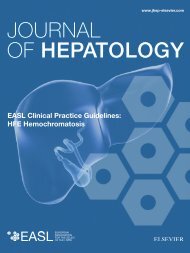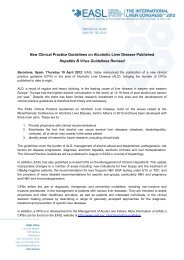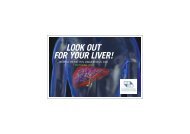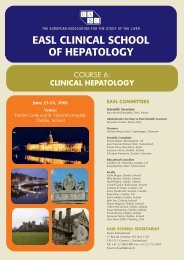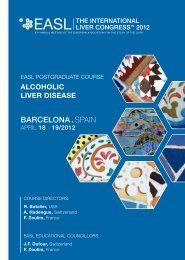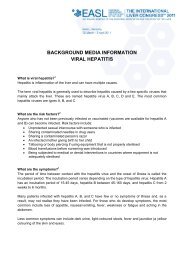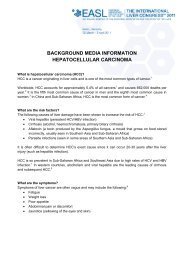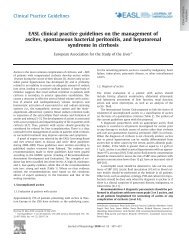Background Media Information: Alcoholic Liver Disease - European ...
Background Media Information: Alcoholic Liver Disease - European ...
Background Media Information: Alcoholic Liver Disease - European ...
- No tags were found...
You also want an ePaper? Increase the reach of your titles
YUMPU automatically turns print PDFs into web optimized ePapers that Google loves.
Fatty liver disease rarely causes any symptoms and therefore can often beundetected. Blood tests designed to detect liver damage may also be normal 4 .By itself, fatty liver does not cause any significant liver damage and can be reversed ifalcohol consumption is stopped, however it is an important warning sign that alcoholintake is reaching a harmful level 1 .<strong>Alcoholic</strong> hepatitis<strong>Alcoholic</strong> hepatitis is the second more serious stage of alcoholic liver disease and canbe caused by a prolonged high intake of alcohol or a large intake of alcohol in a shortperiod of time (binge drinking) 1 .At this stage, there is accumulation of fat in the liver cells as well as inflammation ofthe liver which disrupts its normal function 3 . Alcohol also causes blood vessels withinthe liver to contract, which interferes with blood flow. As a consequence, parts of theliver can then become starved of oxygen, causing the cells to die 3 .Mild forms of alcoholic hepatitis may not cause noticeable symptoms, but as thedisease becomes more advanced and the liver more damaged, patients mayexperience general malaise, fever, weight loss, tenderness of the abdomen andjaundice – a yellowing of the skin 4 .An episode of hepatitis has a 10-20% risk of death and many patients will developlong-term complications 3 . Some patients may recover from alcoholic hepatitis withtotal cessation of alcohol consumption but for some, hepatitis persists and leads tocirrhosis 3 .CirrhosisThe toxic effects of alcohol cause 20% of heavy drinkers to develop irreversible liverdamage, or alcoholic cirrhosis 4 . Cirrhosis is the final stage of alcoholic liver diseaseand occurs when prolonged inflammation of the liver has caused scarring and loss offunction. This is a serious and potentially fatal condition with liver failure and death asthe probable end result.The damage caused by cirrhosis is not reversible. In mild to moderate cases, theimmediate cessation of drinking should prevent further damage and could lead to thegradual recovery of liver function. In more severe cases, a liver transplant may berequired 1 .Fatty liver disease and hepatitis can develop at any age. Cirrhosis usually develops inpeople aged 40 or over, however cases of cirrhosis have been reported in people ofall ages, including teenagers 4 .What is the long-term prognosis of alcoholic liver disease?The long-term outlook for alcoholic liver disease can be very variable. For mostpeople with fatty liver disease and mild alcoholic hepatitis, the liver will recover andheal itself if alcohol consumption is stopped. Even in the late stages of disease whencirrhosis is present, the cessation of drinking will reduce further damage to the liverand the chances of survival will be increased.



